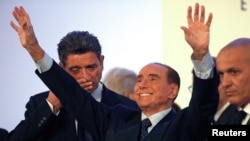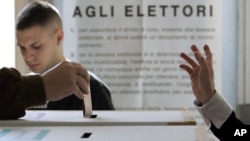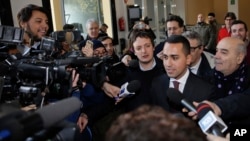Italy’s young adults will likely prove crucial in determining the outcome of the country’s March elections, and there are signs they are turning their backs on mainstream parties.
Elsewhere on the continent the populist surge appears to be receding, but not so in Italy, where the anti-establishment, euro-sceptic Five Star Movement (M5S), founded nine years ago by comic-turned-blogger Beppe Grillo, could well become Italy’s largest party.
Other populist parties are set to benefit from voter disaffection with politics-as-usual, helping to return to the political limelight Silvio Berlusconi. The 81-year-old four-time prime minister has, to the frustration of his foes, forged an improbable political comeback thanks to smart coalition-building.
Campaigning, which began December 28, has got the bond markets and foreign investors worried. Italy’s public debt, at 132 percent of GDP, is the second-highest in the euro area, after Greece.
According to opinion polls, M5S, which advocates for internet-based democracy and has been echoing the anti-migrant sentiments of the traditional right in recent months, is currently leading the center-left Democratic Party, the main partner in the government of Paolo Gentiloni, by three points.
Young voters have suddenly become important. Voters under 35-years-old only make up 22 percent of the electorate and politicians traditionally focus campaigns on the elderly. But under a new electoral law that encourages parties to build and fight elections as coalitions, the politicians are campaigning with the young more in mind.
The left’s courting, led by former prime minister and Democratic Party leader Matteo Renzi, of 20 and 30 year-olds has had little impact.
The Five Star Movement leads by four percent when it comes to voters under the age of 35. It has been mounting a strong social media campaign led by its 31-year-old party leader Luigi Di Maio.
Critics highlight Di Maio’s inexperience and say he’s ill-equipped to serve as the country’s prime minister. But he’s one of the country’s most popular politicians, and media commentators have acknowledged his skill as a party manager. He has done much to temper the rebel activism of M5S in his efforts to shape the movement as a credible political force.
Young adults are also attracted by radical groups and fringe parties, including the neo-fascist Brothers of Italy and the anti-immigrant Northern League, who are members of Berlusconi’s coalition, which won regional elections in Sicily last year.
“It doesn’t seem to me that the government is doing anything for young people,” said Veronica Deiana, aged 25. Like many young Italians she dreams of emigrating. ”I don’t see any future here. My thought is to move abroad, possibly to Spain," she says.
Deiana has a retail sales job that took her a year to find, in a town just outside Rome, but it pays too little for her to think about moving from her parents' home or to save.
Others search for jobs to no avail. Italy’s economy has been struggling to recover from the longest recession in its modern history. Economists blame high taxes, a rigid labor market, government overspending, burdensome regulation and a bloated bureaucracy, which they say has made Italy uncompetitive.
Public opinion polls put Berlusconi’s coalition in the lead with around 34 percent of the vote, followed by M5S at 27 percent and the governing Democratic Party (PD) in the low 20s.
Come March no single party will command a parliamentary majority and be able to form a government alone. Neither the PD nor Berlusconi have ruled out trying to form a coalition government with M5S.







